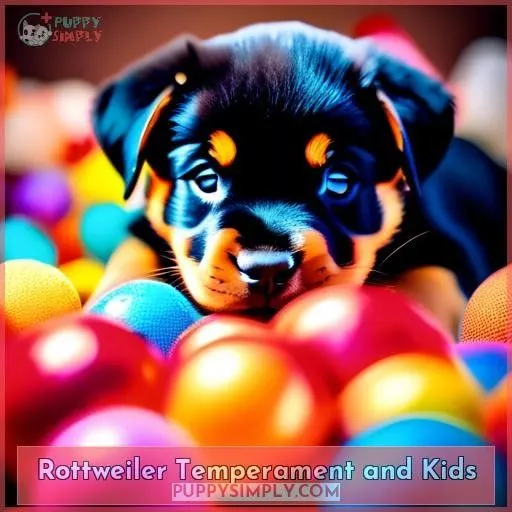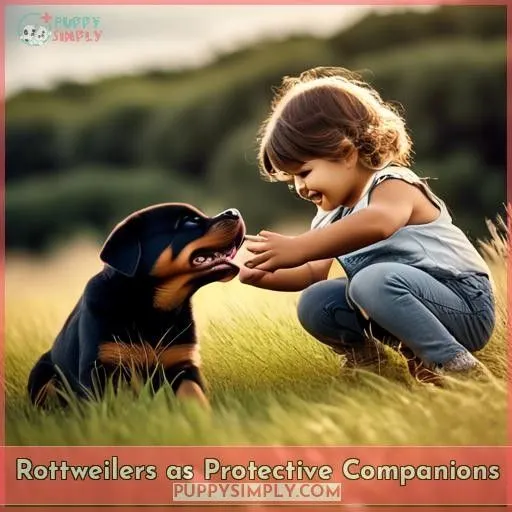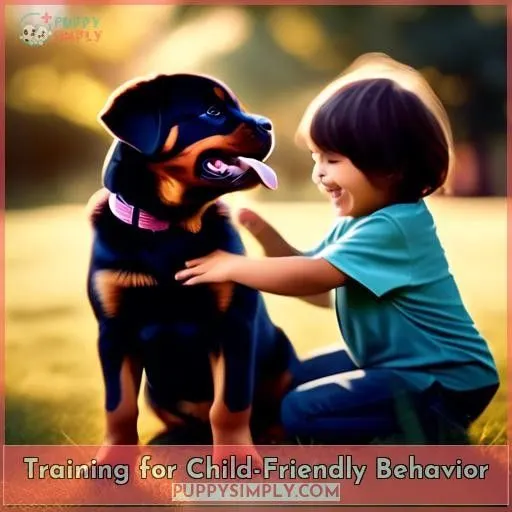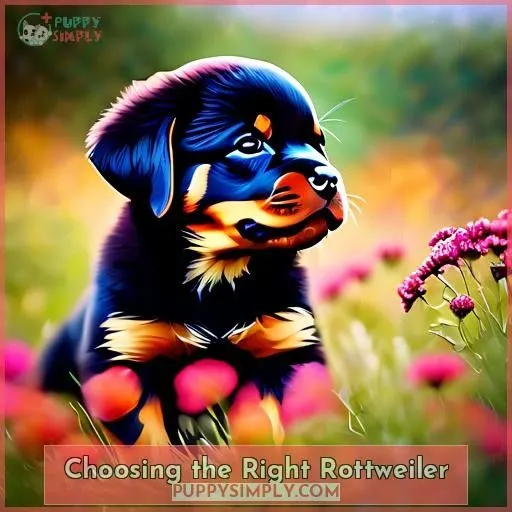This site is supported by our readers. We may earn a commission, at no cost to you, if you purchase through links.
With proper socialization and training, rottweiler puppies can make excellent companions for kids.
Their protective nature and loyalty create a devoted bond when raised positively.
However, you’ll need to manage their substantial size, physicality during play, and excitement levels through constant supervision and obedience training.
Introducing them gradually to children, using positive reinforcement techniques, and establishing boundaries are paramount.
Evaluating individual temperaments and involving kids in their care also foster family harmony.
Exploring these aspects further guarantees a safe, rewarding experience with your rottweiler pup.
Table Of Contents
Key Takeaways
- Rottweilers are known for their protective and affectionate nature, making them excellent companions for families with children.
- Proper socialization and training are crucial to ensure Rottweiler puppies are safe and enjoyable companions for kids.
- Rottweilers’ size and energy levels must be managed through constant supervision and obedience training to prevent accidental injury or hazardous play.
- Rottweilers’ guarding instincts can be an asset, but it’s essential to address any misguided protectiveness through positive reinforcement training and socialization from an early age.
Are Rottweilers Puppies Good With Kids?
Yes, Rottweiler puppies can be good with kids. They’re generally friendly, protective, and great playmates, making them suitable for children.
However, parental supervision is necessary to guarantee the safety of both the children and the dog, as Rottweilers can accidentally knock over a child due to their size and energy.
It’s essential to train the dog to play gently and teach children how to interact safely with the dog. Early socialization and training are paramount for Rottweilers to be well-behaved around children.
Rottweiler Temperament and Kids
Rottweilers are known for their protective and affectionate nature with their families, including children. Their high energy levels and playfulness can make them excellent companions for kids, but you’ll need to channel that energy constructively through proper training and exercise.
Protective and Affectionate Nature
Rottweilers are renowned for their unwavering loyalty and fondness, rendering them ideal companions for families with children.
They generally exhibit patience and gentleness, often demonstrating a strong sense of protectiveness towards those they hold dear. Their protective nature can encompass children, which is why they’re frequently lauded for their loving and gentle demeanor toward kids.
However, it’s imperative to bear in mind that any canine, irrespective of breed, may exhibit aggression in the absence of appropriate training and socialization.
Energy Levels and Playfulness
Rottweiler puppies are renowned for their boundless energy and exuberance.
These traits can render them potentially hazardous playmates for young children.
To foster a harmonious family environment, it’s imperative to evaluate the dog’s vitality and impart training to promote safe play.
This entails monitoring play sessions, facilitating their interaction with children, and instilling obedience commands.
By harnessing their excitement and curbing rambunctious behavior, Rottweilers can evolve into exceptional companions for kids.
Rottweiler Size Considerations
You must account for a Rottweiler’s substantial size and physicality when considering one as a family pet, especially if young children are involved. Rottweilers may playfully paw, jump up, or knock over kids unintentionally during energetic play sessions, so constant supervision is essential to prevent accidental injury.
Physicality During Play
Regarding playing with Rottweiler puppies, their dimensions and vigor can be a concern.
These dogs are renowned for their fun-loving nature, notably when they are young.
However, their size and build can render them hazardous playmates for very young children.
They could prance about and knock over kids when overly excited.
To ensure safety, supervision is essential during play sessions.
Positive reinforcement-based training can help in managing their excitement and teaching them appropriate play behaviors.
Dog parks can be an ideal location for them to socialize and expend energy.
Supervision With Young Children
In regards to child safety and Rottweilers, consider playtime supervision as the key ingredient to family harmony. It’s all about directing suitable interaction with a dash of patient training. Monitor behavioral signals, ensuring a serene and steady temperament prevails. Through positive reinforcement, you’ll nurture a connection that’s both secure and delightful, like a well-protected cookie jar.
Socializing Rottweiler Puppies
You’ll want to introduce your Rottweiler puppy to children gradually and in a positive environment. Reward-based training that pairs socialization with tasty treats helps build the pup’s confidence around kids.
Introducing to Children
Introducing your Rottweiler puppy to children is essential for their socialization and future behavior. Here’s how to do it properly:
- Start promptly: Begin socializing your puppy with children as soon as feasible.
- Evaluate temperament: Observe your puppy’s responses to children to determine their suitability as family companions.
- Monitor interactions: Always supervise initial meetings between your puppy and children to guarantee safety and positive experiences.
- Brief training sessions: Keep training sessions short and based on positive reinforcement to establish good behavior.
- Family bonding: Encourage interaction between your puppy and children to strengthen family ties and encourage a low level of aggression.
Positive Reinforcement Training
After introducing your Rottweiler puppy to the kids, it’s time to delve into positive reinforcement training. This method, using rewards like treats and praise, taps into their enthusiasm to learn. Think of yourself as a confident leader guiding an intelligent breed through a world of clicker training and treat motivation. It’s not just about food and water; it’s about fostering connections.
| Method | Benefit | Example |
|---|---|---|
| Clicker Training | Immediate feedback | Click = Good job! |
| Treat Motivation | Encourages enthusiasm | Treat for sitting |
| Socialization Classes | Builds confidence | Puppy playdates |
Rottweilers as Protective Companions
You shouldn’t underestimate a Rottweiler’s guarding instincts around children–their protective nature can be an asset but also requires vigilance. While the breed’s reputation for aggression is often exaggerated, it’s vital to address any misguided protectiveness through positive reinforcement training and socialization from an early age.
Guarding Instincts
Rottweilers are renowned for their protective instincts, making them exceptional companions for safeguarding. As a breed, they possess a robust loyalty and protective disposition, which can extend to young ones. However, it’s imperative to bear in mind that any dog, including Rottweilers, can become aggressive in the absence of adequate training and socialization.
Rottweilers are generally affectionate with their family members, but their size and energy levels may influence their suitability for young children. While Rottweilers are often kept as family pets in households with children, their exuberance combined with their size and build can render them potentially risky playmates for very young children. They may bounce around and inadvertently knock young children over when excessively excited.
When selecting a Rottweiler for a family with children, it’s essential to contemplate the dog’s age, socialization, personality, and training. Adult Rottweilers’ personalities are more readily assessable than puppies, and they’re more likely to have received partial training and housebreaking. Purebred dogs can be found at rescue organizations and Rottweiler-specific rescue groups.
Rottweilers are frequently employed as guard dogs owing to their size, loyalty, and protective nature. They can be trained to guard homes and properties, but it’s imperative to guarantee that they’re well-trained and socialized to prevent aggressive behavior. Proper training and socialization are paramount to channeling these instincts in a positive and controlled manner.
Misconceptions About Aggression
Rottweilers often get a bad rap as aggressive guard dogs, but that’s just scratching the surface. Here’s the real scoop:
- Breed Misconceptions: They’re not born aggressive; poor Rottweiler training and neglect can lead to unwanted behaviors.
- Aggression Triggers: Understanding and managing these can noticeably reduce bite risk.
- Child Supervision: Always a must, ensuring playful pups don’t accidentally overwhelm with their loyalty and attention.
Training for Child-Friendly Behavior
Early socialization and obedience training are essential to mold Rottweilers into well-behaved family companions. You’ll need to teach vital commands like drop it, easy, and relax to help manage their energy around children and prevent unintentional rough play or nipping. Positive reinforcement methods build a strong human-canine bond and a compliant puppy who respects both adults and kids.
Obedience Commands
To make sure your Rottweiler puppy is good with children, obedience training is necessary.
Set up a command system with clear communication, using positive reinforcement techniques.
Get your puppy used to being around children and other dogs.
Giving praise and outside time as a reward.
As smart and easy-to-train dogs, Rottweilers respond well to this approach.
Becoming social creatures who understand their place in your family.
Managing Excitement and Rough Play
To guarantee your Rottweiler is a child-friendly companion, it’s imperative to control their enthusiasm and boisterous play.
Begin by establishing distinct boundaries and instilling obedience commands. Utilize positive reinforcement methods, such as treats or compliments, to foster desirable behavior.
For large breeds like Rottweilers, it’s vital to curtail training sessions and refrain from rough play.
An adult Rottweiler can become an affectionate companion with an average life expectancy of 12-14 years, so invest in their training now for a devoted, loyal family member.
Choosing the Right Rottweiler
You’re better off considering an adult Rottweiler if you have young children, as their temperaments are easier to assess than puppies. Adopting from a reputable rescue organization or responsible breeder who carefully evaluates temperaments and matches dogs with families is essential to ensuring a good fit with kids.
Assessing Adult Dog Personalities
When selecting a Rottweiler as a family companion, it’s imperative to evaluate the adult dog’s disposition.
Temperament variations can profoundly affect your family’s tranquility.
Rescue organizations assess dogs’ temperaments, making them a dependable resource for finding a suitable match.
Adopting an adult Rottweiler offers insights into their personality, as their dispositions are more readily discernible than puppies‘.
Home surroundings can also shape a dog’s temperament.
Early interaction with children can help guarantee that your Rottweiler is at ease with them.
Rottweilers are frequently employed as protection dogs, military service dogs, and police dogs, showcasing their guardian nature.
Importance of Rescue and Breeder Selection
When it comes to selecting the ideal Rottweiler for your family, the decision between a breeder and a rescue organization can be significant. Both choices offer distinct advantages, and the optimal choice hinges on your unique requirements and circumstances.
Breeders provide puppies reared in controlled environments, enabling you to evaluate their temperament and health before welcoming them into your home. They can also offer guidance on training and socialization, which is vital for a Rottweiler’s development. However, it’s imperative to select a reputable breeder who prioritizes the well-being of their puppies, as some breeders may prioritize producing large numbers of puppies without considering their health or temperament.
In contrast, rescue organizations provide an opportunity to provide a home for dogs that may have been abandoned, abused, or neglected. These organizations often provide veterinary care and rehabilitation for the animals in their care, ensuring they’re healthy and ready for adoption. However, the dog’s background may not be fully known, which could affect their temperament and suitability for your family.
Veterinarian recommendations can be invaluable when adopting a Rottweiler, as they can provide guidance on the dog’s health and any necessary treatments or vaccinations. They can also offer advice on training and socialization, which is critical for a Rottweiler’s development.
Ultimately, the decision between a breeder and a rescue organization depends on your personal preferences, circumstances, and the specific needs of your family. Both options offer advantages and disadvantages, and it’s essential to conduct thorough research and select a reputable source for your new Rottweiler companion.
Rottweilers in Family Dynamics
You’ll want to involve your kids in the care and training process for your Rottweiler pup from an early age.
This helps establish boundaries, build the dog’s confidence around children, and facilitates a harmonious family dynamic.
At the same time, you must set clear rules for your children’s interactions, like prohibiting rough play, pulling on the dog, or disturbing it while eating.
Safety should always be the top priority.
Involving Kids in Care and Training
Including kids in care and training is paramount for a harmonious family dynamic with your Rottweiler. Sharing parenting responsibilities and pet ownership fosters a sense of belonging and understanding among family members.
Teaching children to respect boundaries and cuddle properly helps establish positive reinforcement training. Sibling dynamics can also be enhanced through shared care and training.
Establishing Boundaries and Safety
As a responsible Rottweiler owner, it’s imperative to set limits and guarantee safety.
Monitor interactions between your Rottweiler and kids, particularly when they’re young.
Train your dog to honor limits and to be by itself when needed.
Socialization is vital, so introduce your Rottweiler to children and use positive reward training.
Keep in mind, any dog, including Rottweilers, can become aggressive without proper training and socialization.
Conclusion
Like a thunderous wave crashing on the shore, raising Rottweiler puppies alongside kids demands unwavering commitment.
With persistent socialization, positive reinforcement training, and responsible supervision, you’ll forge an unbreakable family bond.
Rottweilers’ protective nature renders them exceptional companions when their energies are channeled appropriately.
By heeding expert insights on Rottweiler puppies good with kids, you’ll cultivate a harmonious, fulfilling environment for all.














